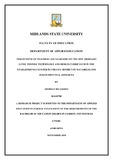Please use this identifier to cite or link to this item:
https://cris.library.msu.ac.zw//handle/11408/3592| Title: | Perceptions of teachers and learners on the new ordinary level textile technology and design curriculum in the Ntabazinduna cluster in Umguza district in Matabeleland north province, Zimbabwe | Authors: | Rwadziso, Sithole | Keywords: | Teaching and learning Textile technology |
Issue Date: | 2018 | Publisher: | Midlands State University | Abstract: | This research set out to identify and understand teachers and learners’ perceptions towards Textile Technology and Design (TTD) in the Ntabazinduna cluster of Matabeleland North province’s Umguza district. The study identified factors which influenced teachers and learners’ attitudes and perceptions. Scholarly viewpoints from African and Zimbabwean perspectives were employed to discuss the issue of TTD curricula under different settings. Scholarly views were given to discuss TTD. The Gestalt and Cognitive approaches were used in understanding the general perceptions about the learning of practical subjects and factors influencing perceptions were discussed. The research used a descriptive survey design and a population of 205 teachers and learners was used. A sample of 30 learners and 5 teachers was used. Purposive sampling was used to select the learners. Questionnaires, Participant Observations and interviews were selected as the data collection instruments. The research findings were presented in tables, pie charts and summative analytic descriptions according to the research questions. The research concluded that the the Textile Technology and Design (TTD) teachers and learners in the Ntabazinduna cluster understood what the subject entailed and that they were aware that the subject was more inclined and suited to address the 21st century educational needs of using ICTs. The research also concluded that the attitudes and perceptions that teachers and learners expressed were mostly negative owing to issues such as poor consultations by the government prior to introduction of the curriculum, techno-phobia by some of the teachers and learners who were not conversant with the tools that were needed to make the curriculum function effectively as well as the inability by the community, peers, teachers and parents to motivate the learners towards a more optimistic outlook. The perceptions of teachers and learners in the Ntabazinduna cluster were an indication of the greater macro-economic environment in which they operate in. The perceptions and attitudes were more related to the socio-economic systems failures of the whole nation than those specific to the subject and its characteristics. Some of the recommendations made were that Textile Technology and Design teachers should be retrained in the use of ICT related to their subjects and that dialogue and consultations between the Ministry of Primary and Secondary Education (MoPSE) , the Curriculum Development Unit (CDU) and teachers’ unions should be more holistic in approach to ensure that every view was heard and every credible point was pursued to come up with a TTD curriculum that addressed most of the stakeholder needs. | URI: | http://hdl.handle.net/11408/3592 |
| Appears in Collections: | Bachelor of Education in Fashion and Textiles |
Files in This Item:
| File | Description | Size | Format | |
|---|---|---|---|---|
| Sithole final document.pdf | Full Text | 996.45 kB | Adobe PDF |  View/Open |
Page view(s)
156
checked on Apr 29, 2025
Download(s)
112
checked on Apr 29, 2025
Google ScholarTM
Check
Items in MSUIR are protected by copyright, with all rights reserved, unless otherwise indicated.



